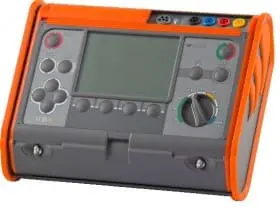Also known as ground resistance meters, these devices are used to measure and test the grounding for ensuring the safety of the workers doing operations on that particular ground. Simplifying the concept, let us take the example of a newly constructed house. As we need to electrically equip the house with switches, meter and change over, there has to be a good relationship between the earth and the electrodes or electricity points connected to it. Henceforth, to ensure sufficient electrical continuity between conducting apparatus and earth, testing of Earth resistance becomes essential. To understand the working of this meter, meaning of important terms associated with the subject matter is essential to be looked upon.
Earth resistance
Earth resistance is the resistance between boundless earth and earth electrode which is dependent mainly on three factors:
1. The resistance of the electrode imbedded inside,
2. The contact resistance between surface of the electrode and the soil,
3. The resistivity of the soil occupying the area between the electrode and earth
Generally, only soil resistivity is checked because first two factors are relatively less important than the third one.
As soil resistivity is relatively important, its’ mainly dependent on factors like:
- Grain distribution in the soil
- Soil temperature
- Chemical composition
- Electrical conductivity due to electrolysis
It is important to note here that soil resistivity can be fairly improved by filling the surrounding of electrode with soluble like common salt (nacl) which is used the most for the purpose. Also, when it comes to for installing the Earthing system, Moist soil types like wet loamy soil or clay soil are preferred as against dry soils like soil with gravel chalk, limestone content or dry sand. Stony grounds are suggested to be avoided.
Earth Resistance Meter/ Ground Resistance Testers
Ground resistance testers/meters are devices that are used to check the resistance of ground towards the flow of current and to test electrical grounding systems. It assures optimum electrical continuity between conducting objects and earth. An equipment is grounded deep inside to ensure improved soil resistivity and then is permanently connected to earth through a ground connection with a genuinely lower impedance and a fair current- carrying capacity so as to avoid a fatal voltage buildup that can show up by a ground fault current.
Functions:
There are a number of ground testers designed for various purposes and they deliver several important functions as follows:
- One of the main function of these testing models is to record some measurements like grounding system resistance, insulation resistance, earth continuity, current leakage, and ground bond. Based on these measurements, there is a range of ground testers designed to fulfill the purpose of each one of these. Ground resistance testers themselves make the measurements for both Grounding system resistance and insulation resistance.
Another essential functions can be:
- To measure earth continuity, current leakage, and ground bond. Earth continuity devices are the subject matter used to test various electrical instruments for taking these measurements.
- To measure grounding systems for infrastructural projects like road building or constructions and telecommunications projects (installing network towers, optic fiber cables) besides other applications.
- Insulation resistance testers detect the resistance of insulators.
- Current leakage testers test the amount of current that leaks into the ground. This category of testers is important to ensure safety of instruments that are surrounded by people.
- Ground-bond ground resistance testers are used in ground bond or high-current continuity testing so as to confirm the electrical integrity of an equipment.
- Other types of ground resistance testers are also easily available to cater to various needs of the earthing system installation.
Amperis Earth Resistance and Resistivity Meters
Earth Resistance and Resistivity Meters AMRU-30
- Ergonomic instrument
- Wide range of applications
- Comes with double insulation, CAT III 300V measurement category and IP65 protection
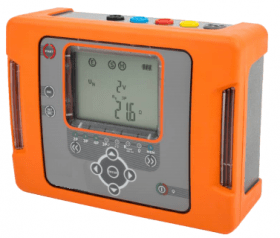
Earth Resistance and Resistivity Meters AMRU-21
- Adhering to following EN 55761 and IEC 61557, this equipment has dual electrical insulation,
- The measuring type is CAT IV 300V as per EN 61010-1, and
- Degree of protection of the housing is Ip54 according to EN 60529.
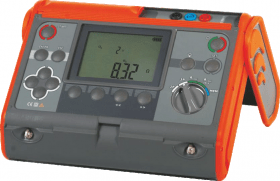
Multifunction electrical Installations Meter AMPI-525
Tailor made for Short-circuit loop measurement comprising:
- Impedance measurement with 23A (44A phase-to-phase)
- Short-circuit resistor RZW =10Ω,
- Measurement range: 95...440V,
- Frequency 45...65Hz and lot more
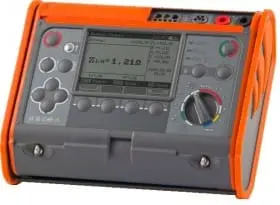
Earth Resistance and Resistivity Meter and Multifunctional suitcase AMPI-520
- Suitable for diagnostic and analyzing purposes in compliance with the IEC 61557 standard.
- Manufactured to measure and record a number of parameters, such as AC voltage, current, power, etc.
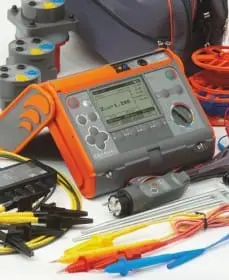
Earth Resistance and Resistivity Meters AMRU 120
For Measuring:
- Resistance of grounded connections using additional electrodes,
- Resistance of ground connections using additional electrodes and clamps (for measuring connections to multiple grounds),
- Checking soil resistivity using Wenner method etc.
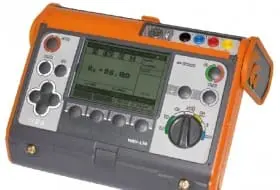
Earth Resistance and Resistivity Meters AMRU-200
- Only meter in the market using all measurement methods: Earth resistance measurement with 2-pole, 3-pole, 4-pole method.
- Impulse earth impedance measurement, two kinds of measuring impulse 4/10μs, 10/350μs.
